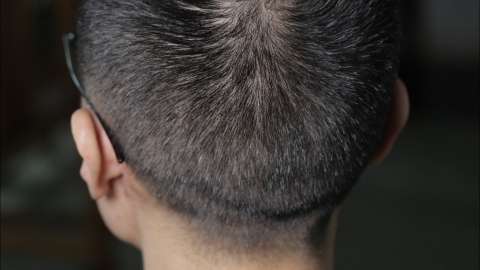What causes pain in the back of the head?
Headaches at the back of the head may be caused by insufficient sleep, mental stress, migraines, cervical spondylosis, hypertension, and other factors. Improvements can be made according to different situations. It is recommended to seek medical attention promptly and undergo treatment under a doctor's guidance.

1. Insufficient Sleep: Long-term late nights and irregular sleep schedules prevent the brain and body from getting sufficient rest, keeping cerebral blood vessels in a tense state and causing headaches at the back of the head. It is recommended to adjust sleep patterns, ensuring 7-8 hours of high-quality sleep daily, avoiding electronic devices before bedtime, and creating a quiet and comfortable sleeping environment.
2. Mental Stress: Prolonged mental tension due to pressure from study, life, and other aspects causes continuous contraction of neck and scalp muscles, leading to headaches at the back of the head, often accompanied by anxiety and irritability. It is recommended to relieve stress through exercise, listening to music, and other methods, and also to perform head massages to relax muscles and alleviate pain.
3. Migraine: This condition may be triggered by various factors such as heredity, endocrine disorders, and diet. During an attack, pulsating pain occurs on one side of the head, which may extend to the back of the head, accompanied by symptoms such as nausea, vomiting, photophobia, and phonophobia. Patients may take medications such as ibuprofen sustained-release capsules, zolmitriptan tablets, and acetaminophen tablets under a doctor's guidance to improve symptoms.
4. Cervical Spondylosis: Long-term poor neck posture due to studying or using mobile phones can cause degenerative changes in the cervical spine, compressing surrounding nerves and blood vessels, resulting in headaches at the back of the head, accompanied by neck stiffness, limited movement, and numbness in the upper limbs. It is recommended to follow medical advice to use medications such as Jingfukang granules, mecobalamin tablets, and diclofenac sodium sustained-release tablets to alleviate discomfort.
5. Hypertension: Poor lifestyle habits, heredity, and other factors may lead to hypertension. Elevated blood pressure increases pressure on cerebral blood vessels, causing headaches at the back of the head, often accompanied by dizziness, palpitations, and blurred vision. Patients may take medications such as nifedipine controlled-release tablets, irbesartan tablets, and amlodipine besylate tablets under a doctor's guidance to improve symptoms.
In daily life, it is recommended to regularly stretch neck muscles, maintain correct sitting and standing postures, and use hot or cold compresses to relieve muscle tension.
References:
[1] Zhang Shitao. Etiology, Symptoms, Treatment, and Prevention of Cervical Spondylosis [J]. Everyone's Health, 2025, (02): 67-69.




